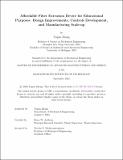Affordable Fiber Extrusion Device for Educational Purposes: Design Improvements, Controls Development, and Manufacturing Scale-up
Author(s)
Zhang, Yiqian
DownloadThesis PDF (35.25Mb)
Advisor
Anthony, Brian W.
Terms of use
Metadata
Show full item recordAbstract
The Fiber Extrusion Device (FrED) is an affordable desktop tool intended for engineering education. It mimics the fiber draw process, allowing students to study topics such as data acquisition, control systems, computer vision, data analytics, and smart manufacturing. As an educational tool, the goal of the device is to replicate the practical laboratory experience in remote learning scenarios. FrED has gone through multiple iterations, yet several outstanding issues remain. Building on the 2023 team’s progress, the 2024 project objectives include refining the design, developing controls, scaling up manufacturing, designing the assembly line, managing inventory, creating educational content, and conducting user testing and pilot runs. This thesis specifically details the author’s contributions to enhancing mechanical designs, advancing control systems, increasing production capacity, and planning educational materials. Mechanical components in the frame, the cooling system, and the diameter measurement system were redesigned to improve stiffness and stability. Local PID controllers were implemented for the DC motor and heater, effectively closing the feedback loop for fiber diameter control. The production target of manufacturing 35 FrED units was successfully achieved within the planned timeframe, with the packaging design optimized for efficient shipping. Additionally, an assembly manual, a graphical user interface, and control activities were developed as part of the educational content. Three user testing sessions were conducted to gather feedback.
Date issued
2024-09Department
Massachusetts Institute of Technology. Department of Mechanical EngineeringPublisher
Massachusetts Institute of Technology